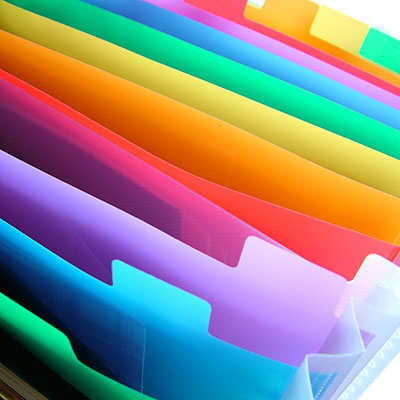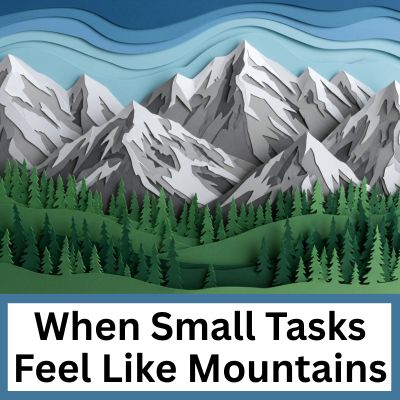Why Is Organizing Paperwork So Hard? Part 2

As I’m preparing my lesson plan for my paperwork organizing class coming up in March, I’ve been thinking about all the reasons why paperwork is so terribly challenging for such a large number of people. Paperwork is something I help a lot of people with because it can be incredibly overwhelming for people. And while it takes some skills to organize the kitchen, clothing, and the garage, the skills required for organizing paperwork are a bit more technical than organizing the rest of the house. There are lots of different methods to organizing paperwork, and I help my clients determine which will be the best way for them to keep their paperwork in check.
Last week I wrote “Why Is Organizing Paperwork So Hard? Part 1”, and today’s article is the sequel, Part 2. In this post, I’ll talk about additional reasons why it’s difficult to organize your paperwork, and give some pointers about what to do about it.
- Are you overwhelmed by the sheer quantity of paperwork that you have to sort through and process? This is often caused when there has been an acute event such as the loss of a loved one, the transition of a business, or a medical emergency. You may also have too much paperwork that has built up over a long period of time for a variety of reasons. You may be too busy to deal with it, you may not know how to deal with it, or you may be actively avoiding dealing with it. People who are chronically disorganized may have made repeated attempts to get organized, but feel like nothing sticks. And some people who have organizational challenges may make major headway organizing their paperwork, but can make a huge mess of things in a very short period of time. When this happens, it’s often because someone has a health issue that impairs their fine motor skills or executive functioning skills. Incoming mail is another reason that causes an overabundance of paperwork. Luckily, more and more mail is being transmitted electronically these days, but processing mail can still be a real issue for many people.
TIP: Some people allow an overabundance of paperwork into their lives because it’s a form of emotional buffering. This infinite “to-do” task provides the perfect excuse to going out and doing something fun, meaningful, and having a deep emotional connection with others. Ask yourself if you’ve created this never ending item on your to-do list so that you have a valid reason as to why you can’t have strong social connections with others. OR… are you dealing with the opposite issue? You’re great at being social, doing meaningful work in your community, and nurturing authentic connections with others, but you’re avoiding nurturing yourself and your own personal needs to organize your living space? By bringing your subconscious motivations to the surface, you’ll gain consciousness of your desires and are one step closer to aligning to your authentic and intuitive self. When you are in alignment with your intuition, you will naturally find a balance with organizing your paperwork, socializing, and spending time with yourself. If you didn’t have the excuse of needing to organize your paperwork (imagine your paperwork totally organized), what would you really like to do with your time?
- Another very real issue you may have with paperwork is that you may need it in the future. Whether it be that you’ll need a proof of payment, documentation from an accident, or that you’ll need to reference some information from a class you took, you probably want to keep some paperwork around. Do you forget about things if you can’t see them? This is a big reason why many people don’t want to file their paperwork, because they don’t want to forget about it.
TIP: When you’re sorting through your paperwork, get really honest with yourself about whether you’ll need it in the future. If you’ve taken a class and want to keep your notes or other handouts, ask yourself if you’ll realistically ever look at them again. And if you were to throw them out, how difficult would it be to find this information again? Keeping around notes from classes can be a really source of shame and guilt for a lot of people who feel like they don’t know enough. Wouldn’t it be better to trust that you learned all that you needed? It’s very rare to take a class and retain 100% of what you were taught. Have confidence with what you know, and if you want to learn more, you can take another class or find an alternative way to learn the information you want.
With everything you DO want to keep, decide if you want to learn how to digitally store the information. Scanning is very easy, but digital clutter can accumulate at an extremely rapid rate. Do you want to come up with a consistent filing system so that you can find the hard copies easily? There are many different types of filing systems such as traditional file folders, boxes, bags, binders, cubbies, and probably others too! If you’d like to learn more about which one might be right for you, contact me for a consultation or sign up for my paperwork organizing class.
- A common category of accumulated paperwork is bills. These bills may be outstanding overdue invoices, or you may have already paid them and never made a note of your payment. Nevertheless, you might not want to go through your paperwork for fear of owing a lot of money to someone, or fear of spending hours on the phone trying to figure out whether or not a bill has been paid. There may be multiple invoices for the same charge, so figuring out where to start so that you’re not doing double the work is going to be an important part of the process.
TIP: Regulating your nervous system as you work through your overdue bills is going to be imperative. Before you get started, make sure to eat something that makes you feel really strong and clear headed. The last thing you’ll want to eat is a sugary doughnut that is going to destabilize your energy. Sugar may make you feel great for a few minutes, but the repercussions to your emotional health is going to make a task that’s already not fun even worse. Hydrate yourself with pure water or an electrolyte drink, NOT soda. Wear clothes that are very comfortable. Turn on some music that you really like. Light a candle, diffuse some essential oils, and you may even want to call in some non-physical help: loved ones who have passed, Jesus, Jah, guardian angels, or whoever you think can help cut through the heaviness of this daunting chore. Get started by sorting the different bills into categories by vender and then by date. As SOON as you feel your nervous system getting overloaded, STOP what you’re doing. Take a break. You may want to get a glass of water, take a deep breath, go for a walk, stretch your body, or anything else to calm your system. Don’t try to push through because you want to establish new neural pathways that allow you to deal with your bills from a place of calm and centeredness. If you push through while your nervous system is flooded, you’ll be building neural pathways that reinforce that dealing with bills has to be stressful. Once you’ve calmed down, start dealing with your bills again. Soon you’ll be able to go for longer stretches in a calm state, and dealing with your bills will be a quick and easy process.
When it comes to organizing paperwork, what is your favorite method so that you can easily find what you need?

By Jean Prominski, Certified Professional Organizer
Don’t forget to sign up for my organizing classes here
Download my free 5 week journal The Seattle Sparkle Method to Get Organized and Stay Organized
Sign up for my free 4 Day Color to Declutter Challenge.
Become part of a like-minded community by joining my Facebook Group, Declutter and Organize with Seattle Sparkle.
Ready to book a consultation? Complete this form.
For artwork to energize your home, order through jeanprominski.com or on Etsy.




